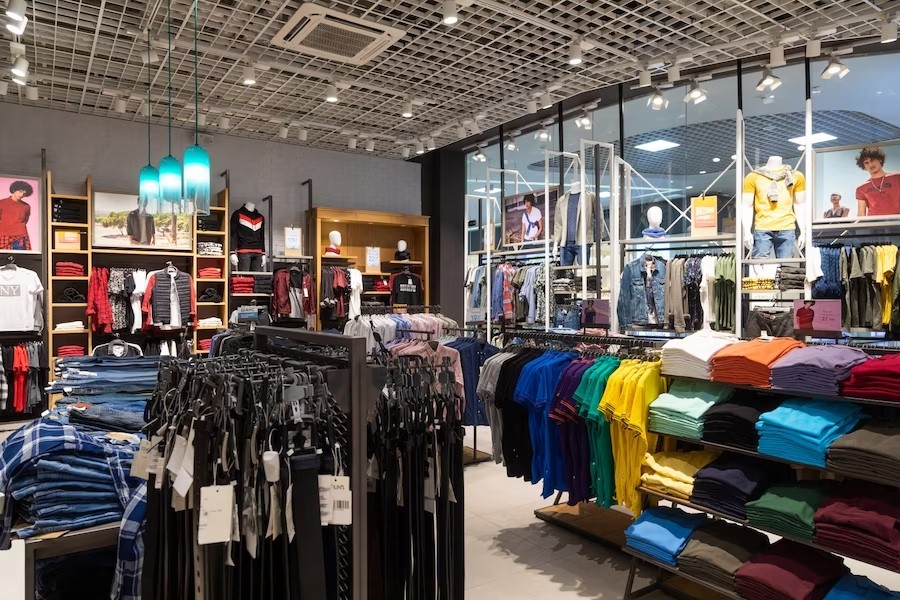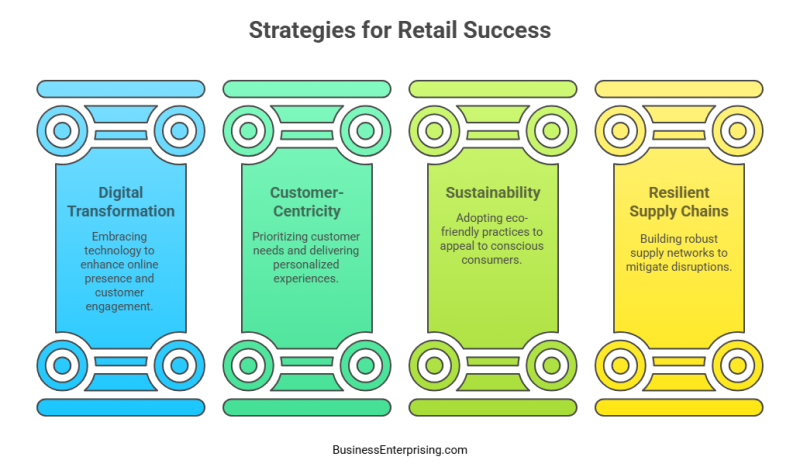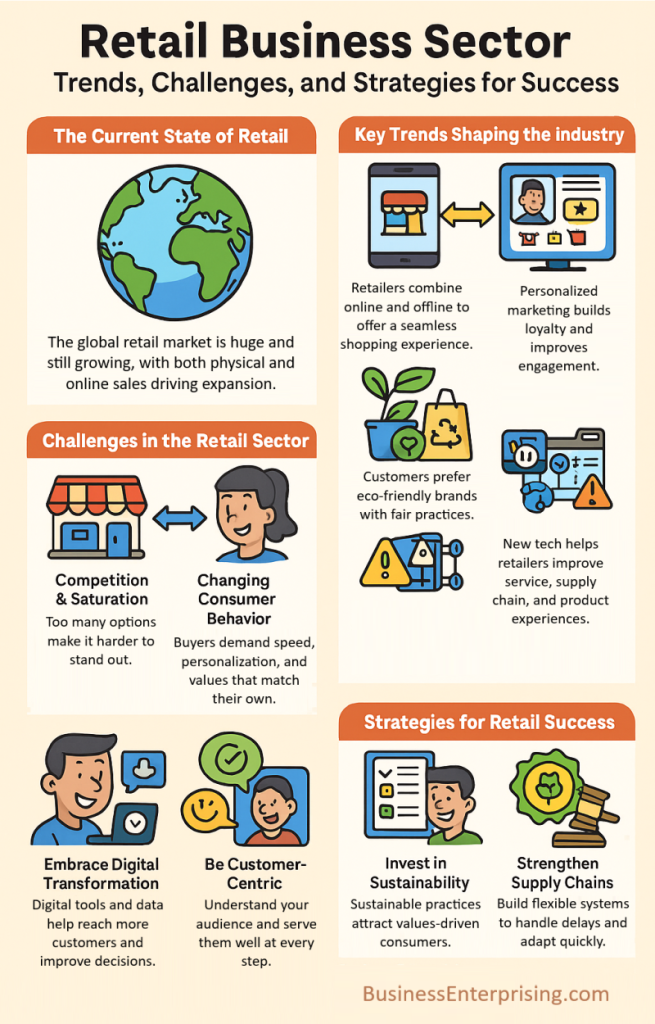The retail business sector continues to grow, yet it remains one of the most competitive industries in the global economy. You see stores adapting quickly as technology shifts and customer expectations rise. Therefore, staying informed about current trends is more important than ever. Retailers who recognize these changes early have a better chance of staying competitive.
Additionally, new technology keeps changing how people shop. From mobile apps to AI tools, digital innovations are now standard across retail. However, technology alone isn’t enough. You still need strong customer service, clear branding, and reliable systems behind the scenes.
Moreover, shoppers expect more than just products. They look for speed, convenience, and brands that reflect their values. Therefore, companies are adjusting everything from packaging to supply chains. You may find yourself rethinking your approach just to keep up.
Challenges like supply chain delays and labor shortages have made things harder. However, businesses that respond quickly can still find ways to succeed. Flexibility matters, and so does knowing your customer. Retailers must shift from short-term tactics to long-term strategy.
The market continues to evolve. Trends rise and fall, but your ability to adapt will help you stay relevant. By understanding what drives retail today, you put yourself in a better position to grow. Additionally, steady improvement builds strength over time.
If you’re part of the retail space or thinking about entering it, you’ll need to act with clarity. The industry moves fast. However, with the right focus, you can build something that lasts.
The Current State of the Retail Industry
The retail business sector continues to grow, even as the market shifts rapidly. Consumer demand remains strong across most categories. However, the way people shop has changed. Many buyers now expect a blend of in-store and online options. Therefore, businesses are adjusting how they sell and deliver products.
Additionally, digital tools are shaping how retailers operate. From mobile apps to online storefronts, technology has become essential. Physical stores still matter, but they now work alongside digital channels. Many retailers use both to meet different customer needs. This hybrid approach allows for greater flexibility and reach.
Moreover, the sector supports millions of jobs around the world. From sales associates to supply chain staff, retail is a major source of employment. You’ll find opportunities for both entry-level workers and seasoned professionals. Therefore, the health of retail affects the broader economy as well.
However, not all retailers are seeing the same success. Those that adapt quickly to change are moving ahead. Others face setbacks from outdated models and slower decision-making. Consumer preferences keep evolving, and fast response times matter more than ever.
The retail business sector remains competitive but full of potential. You’ll need strong systems, smart pricing, and clear branding to stand out. Additionally, customer experience plays a larger role than it once did. If shoppers enjoy buying from you, they’re more likely to come back.
Overall, the market still offers room to grow. With the right tools and strategies, your business can gain an edge. Focus on what people value now, and adjust as trends continue to shift.
Key Trends Shaping the Retail Industry
The retail business sector is evolving fast as new trends shape how companies interact with customers. Online shopping continues to expand. However, physical stores still play an important role in the buyer journey. Therefore, many businesses now use both to meet customer expectations.
Additionally, personalization has become more important. Shoppers want experiences tailored to their preferences. By using data and analytics, you can recommend products and improve satisfaction. Personalized service builds stronger relationships and helps increase repeat sales.
Moreover, consumers care more about values than ever before. They look for ethical sourcing and eco-friendly practices. Therefore, many retailers now promote sustainability as part of their brand. Doing so can attract buyers who care about transparency and social impact.
Technology also plays a big role in shaping trends. From chatbots to virtual try-ons, new tools are changing how people shop. Augmented reality helps users test products from home. Additionally, AI tools can predict demand and improve inventory control.
You must also consider how mobile behavior affects retail. Many shoppers browse on their phones before visiting a store. Therefore, your mobile site or app must be fast and easy to use. A poor mobile experience can cost you sales and repeat visits.
The retail business sector thrives when it adapts quickly. If you follow key trends and listen to customers, you can grow with the market. Additionally, staying open to new tools and ideas helps you keep pace. Change brings challenges, but also opens the door for smarter, more connected retail.
Several key trends are currently shaping the retail industry, influencing how businesses operate and interact with consumers. Understanding these trends is vital for retailers looking to stay competitive and meet evolving customer expectations.
E-commerce and Omnichannel Retailing
Firstly, the rise of e-commerce has revolutionized the retail sector. Online shopping offers consumers convenience, a wider range of products, and competitive pricing. As a result, e-commerce sales have been growing exponentially, with no signs of slowing down. However, this does not mean that physical stores are becoming obsolete. Instead, many retailers are adopting an omnichannel approach, integrating their online and offline operations to provide a seamless shopping experience. By offering options such as click-and-collect, in-store returns for online purchases, and mobile apps, retailers can cater to consumers who value flexibility and convenience.
Personalization and Customer Experience
Moreover, personalization has become a key differentiator in the retail industry. Consumers today expect tailored experiences that cater to their individual preferences and needs. By leveraging data analytics and artificial intelligence, retailers can gain insights into consumer behavior and deliver personalized recommendations, promotions, and communications. Enhancing the customer experience through personalization not only drives sales but also fosters customer loyalty and brand advocacy.
Sustainability and Ethical Practices
Another significant trend is the growing importance of sustainability and ethical practices. Consumers are increasingly conscious of the environmental and social impact of their purchases. Consequently, retailers are under pressure to adopt sustainable practices, such as sourcing eco-friendly materials, reducing waste, and ensuring fair labor practices. Brands that prioritize sustainability and transparency are more likely to resonate with environmentally conscious consumers and build a positive brand image.
Technology and Innovation
Technology continues to play a pivotal role in transforming the retail sector. From artificial intelligence and machine learning to augmented reality and blockchain, technological advancements are enabling retailers to enhance their operations and customer interactions. For example, AI-powered chatbots can provide instant customer support, while augmented reality allows consumers to virtually try on products before making a purchase. Furthermore, blockchain technology can enhance supply chain transparency and traceability, ensuring product authenticity and ethical sourcing.
Challenges Facing the Retail Business Sector
The retail business sector faces constant pressure from growing competition. New players enter the market daily, often with low prices and fast service. Therefore, you must work harder to hold your customer’s attention and loyalty. Standing out takes more than a great product.
Additionally, consumer behavior keeps changing. Shoppers now expect quick service, easy returns, and personalized experiences. If your business doesn’t meet those expectations, people move on quickly. Therefore, you need flexible systems that can shift with customer demands.
Supply chain disruptions also create major setbacks. Delays, shortages, and rising costs affect both sales and customer satisfaction. Therefore, many retailers now focus on building stronger, more adaptable supply chains. It’s not just about keeping shelves stocked. It’s about staying reliable when others can’t.
Moreover, staying compliant with regulations adds another layer of challenge. From product safety to data protection, rules differ by country and state. You must track changes and apply them across your operations. This takes time, money, and constant attention.
Technology also moves faster than most businesses can adapt. New tools offer promise, but adopting them can be complex. Therefore, picking the right solutions for your needs matters more than following every trend. You want tech that helps, not tech that complicates.
The retail business sector will always have obstacles. However, each challenge brings a chance to rethink and improve. If you stay alert and ready to adjust, your business can keep moving forward. You don’t need perfection. Just consistent progress and a willingness to change.
Competition and Market Saturation
Firstly, the retail sector is highly competitive, with numerous players vying for consumer attention and market share. Market saturation, particularly in mature markets, makes it challenging for retailers to differentiate themselves and attract customers. To stand out, retailers must offer unique value propositions, innovative products, and exceptional customer experiences.
Changing Consumer Behavior
Moreover, changing consumer behavior poses a significant challenge. Today’s consumers are more informed, tech-savvy, and demanding than ever before. They seek convenience, personalized experiences, and ethical products. Retailers must continuously adapt to these evolving preferences by embracing new technologies, enhancing their online presence, and aligning their values with those of their target audience.
Supply Chain Disruptions
Supply chain disruptions are another critical challenge for the retail industry. The COVID-19 pandemic highlighted the vulnerabilities in global supply chains, causing delays, shortages, and increased costs. Retailers must build resilient supply chains by diversifying their supplier base, investing in technology, and adopting agile practices to mitigate risks and ensure continuity.
Regulatory Compliance
Additionally, regulatory compliance is a significant concern for retailers, particularly those operating in multiple regions. Retailers must navigate complex and varying regulations related to product safety, data privacy, labor practices, and environmental standards. Staying compliant requires continuous monitoring, investment in compliance management systems, and collaboration with legal experts.
Strategies for Success in the Retail Business Sector
To thrive in the competitive retail landscape, businesses must adopt strategic approaches that address the challenges and capitalize on emerging trends.
Embrace Digital Transformation
Firstly, embracing digital transformation is crucial. Retailers must invest in e-commerce platforms, mobile apps, and digital marketing to enhance their online presence and reach a broader audience. Additionally, leveraging data analytics and AI can provide valuable insights into consumer behavior, enabling retailers to make data-driven decisions and deliver personalized experiences.
Focus on Customer-Centricity
Moreover, a customer-centric approach is essential for success. Retailers should prioritize understanding their customers’ needs and preferences and strive to exceed their expectations at every touchpoint. By offering personalized experiences, exceptional customer service, and loyalty programs, retailers can build long-term relationships and drive repeat business.
Invest in Sustainability
Furthermore, investing in sustainability can differentiate retailers in a crowded market. Adopting eco-friendly practices, sourcing sustainable materials, and promoting transparency can resonate with environmentally conscious consumers and enhance brand reputation. Retailers should communicate their sustainability efforts effectively to build trust and loyalty.
Build Resilient Supply Chains
Building resilient supply chains is another critical strategy. Retailers should diversify their supplier base, invest in technology for real-time visibility, and adopt agile practices to respond quickly to disruptions. Collaboration with suppliers and continuous improvement initiatives can enhance supply chain resilience and efficiency.
Conclusion
The retail business sector continues to change, but the need for clear strategy stays the same. You must balance innovation with stability. Additionally, you need to meet customer expectations while managing costs and operations. Each decision impacts your ability to grow and stay competitive.
However, growth is possible even during uncertain times. Businesses that adapt quickly often find new ways to thrive. Therefore, staying alert to trends and shifting behavior can guide smart choices. You don’t need to follow every trend, but you should understand which ones affect your market.
Moreover, long-term success depends on your ability to keep improving. Whether it’s customer service, product selection, or supply chain systems, every part matters. Therefore, focus on steady progress instead of one-time fixes. Small improvements can build real results over time.
Technology will keep changing how people shop. Therefore, invest in tools that simplify your work and improve your customer’s experience. Additionally, look for ways to use data to make better decisions. If your business can act on what it learns, you’ll stay ahead.
Retail remains one of the most demanding industries. However, it also offers space for creativity, flexibility, and growth. If you stay connected to your customers and focus on value, your efforts will pay off. The retail business sector rewards those who adjust with purpose. Your success depends on how well you respond to change. Stay curious, act with focus, and keep building on what works. This approach will help you stay strong and relevant as the market continues to shift.



